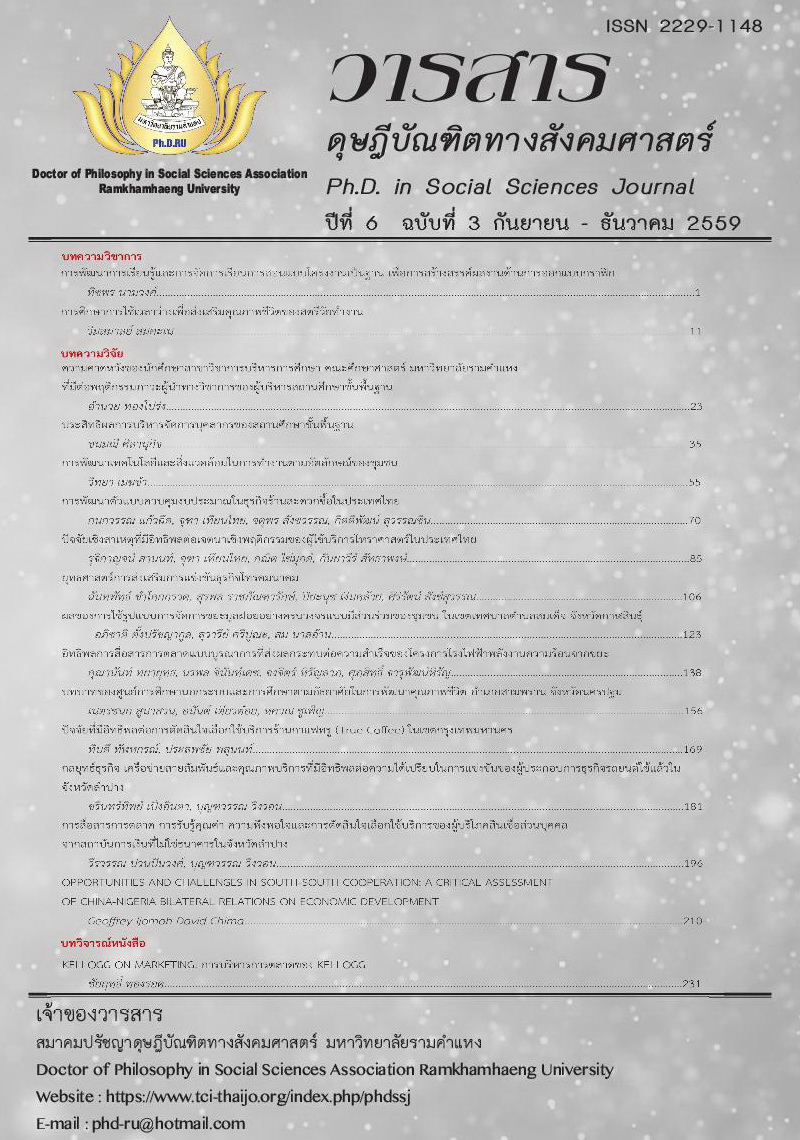บทบาทของศูนย์การศึกษานอกระบบและการศึกษาตามอัธยาศัยในการพัฒนาคุณภาพชีวิต อำเภอสามพราน จังหวัดนครปฐม
Main Article Content
Abstract
การศึกษาครั้งนี้มีวัตถุประสงค์ (1) เพื่อศึกษาระดับความคิดเห็นที่มีต่อบทบาทของ กศน. ในการพัฒนาคุณภาพชีวิตของผู้พลาดโอกาสทางการศึกษา (2) เพื่อศึกษาระดับความคิดเห็นที่มีต่อการดำเนินงานของ กศน. ในการพัฒนาคุณภาพชีวิตของผู้พลาดโอกาสทางการศึกษา และ (3) เพื่อเสนอแนะแนวทางการให้บริการทางการศึกษาของ กศน. เพื่อพัฒนาคุณภาพชีวิตของผู้พลาดโอกาสทางการศึกษาศึกษา
การวิจัยนี้ใช้แบบผสมระหว่างการวิจัยเชิงปริมาณและการวิจัยเชิงคุณภาพ การวิจัยเชิงปริมาณเก็บรวบรวมข้อมูลโดยใช้แบบสอบถาม วิเคราะห์โดยใช้สถิติเชิงพรรณนา ค่าความถี่ ค่าร้อยละ ค่าเฉลี่ย ส่วนเบี่ยงเบนมาตรฐาน ส่วนการวิจัยเชิงคุณภาพ เก็บรวบรวมข้อมูลโดยทำการสัมภาษณ์เชิงลึกบุคลากรของศูนย์การศึกษานอกระบบและการศึกษาตามอัธยาศัยอำเภอสามพราน จังหวัดนครปฐม แล้วทำการวิเคราะห์โดยวิธีวิเคราะห์เนื้อหา
ผลการวิจัย พบว่า (1) ระดับความคิดเห็นที่มีต่อบทบาทของ กศน. ในการพัฒนาคุณภาพชีวิตของผู้พลาดโอกาสทางการศึกษา ได้แก่ บทบาทด้านการส่งเสริมการศึกษาขั้นพื้นฐาน บทบาทด้านการเป็นแหล่งเรียนรู้ภูมิปัญญาท้องถิ่นของชุมชน และบทบาทด้านการส่งเสริมการเรียนรู้เพื่อพัฒนาอาชีพ อยู่ในระดับมาก (2) ระดับความคิดเห็นที่มีต่อการดำเนินงานของ กศน. ในการพัฒนาคุณภาพชีวิตของผู้พลาดโอกาสทางการศึกษา คือ ด้านส่งเสริมคุณธรรม อยู่ในระดับมากที่สุด รองลงมาคือด้านการดำรงชีวิตด้านทักษะอาชีพ และด้านการเรียนรู้ตลอดชีวิต อยู่ในระดับมาก และ (3) แนวทางการให้บริการทางการศึกษาของ กศน. เพื่อพัฒนาคุณภาพชีวิตของผู้พลาดโอกาสทางการศึกษาศึกษา ควรดำเนินการในเรื่อง การ ทำความร่วมมือ (MOU) กับโรงเรียนต่างๆ ในระบบเพื่อขอใช้สถานที่ เพิ่มงบประมาณในการจัดโครงการที่เกี่ยวข้องกับการพัฒนาคุณภาพชีวิตของนักเรียน กศน.
THE ROLE OF THE CENTRE FOR NON-FORMAL EDUCATION AND INFORMAL EDUCATION TO IMPROVE THE QUALITY OF LIFE IN SAM PHRAN, NAKHON PATHOM
The study aimed (1) to study on the role of non-formal education in improving the quality of life of missed opportunities (2) to study the opinion on its implementation. non-formal education in improving the quality of life of missed opportunities, and (3) to offer guidelines for educational services of non-formal education to improve the quality of life of missed opportunities.
This research used a combination of quantitative research and qualitative research . Data were collected by questionnaire The sample of the missed opportunities of the Center for non-formal education and informal education, Sam Phran District, Nakhon Pathom Province amount 297 people. Analyzed using descriptive statistics, frequency, percentage, average, standard deviation. The qualitative research were collected by interviewing the staff of the Centre for non-formal education and informal education district, Nakhon Pathom. Nakhon Pathom province, 11 people were analyzed using content analysis. , Sam Phran District, Nakhon Pathom Province amount 11 people were analyzed using content analysis.
The study found that (1) a comment on the role of Non-formal education in improving the quality of life of missed opportunities , including the encourage of basic education . The role of traditional knowledge as a learning community and the role in encourage learning for professional development. The result is a high level. (2) the comments on the implementation of non-formal education in improving the quality of life of missed opportunities is the moral support. The result is a high level. The second is the existence of professional skills and the field of lifelong learning as a high level. And (3) Guidelines for educational services of non-formal education to improve the quality of life of missed opportunities should be implemented in the cooperation (MOU) with various schools in the system to take place. Increase budget for projects related to improving the quality of lives of Non-formal student.
Article Details
Academic articles, research articles, and book reviews in the Ph.D. in Social Sciences Journal are author’s opinions, and not the publisher’s, and is not the responsibility of the Ph.D. in Social Sciences Journal Philosophy Association, Ramkhamhaeng University. (In the case that research is done on human, the researcher has to be trained in Ethics for Doing Research on Human Training and has to produce the evidence of the training).


